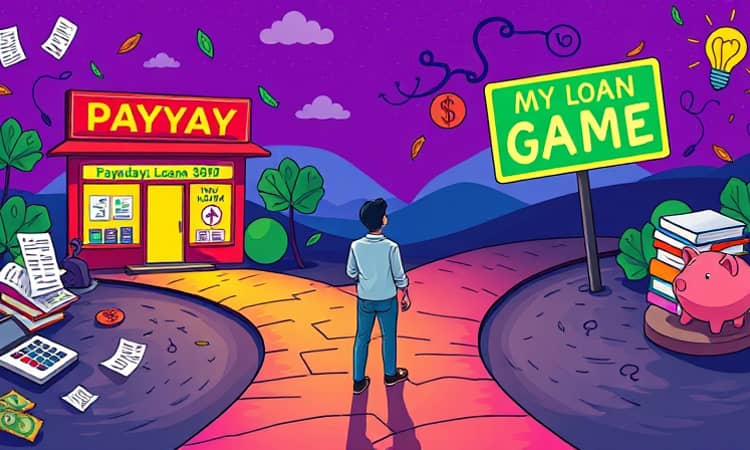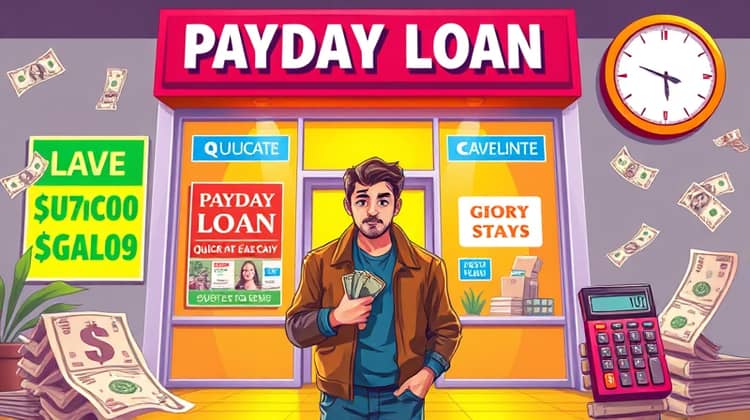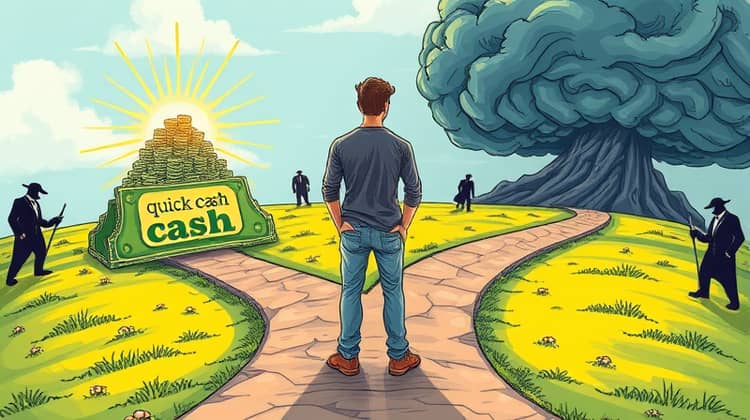Payday Lending Risks: What You Need to Know Before Borrowing

Payday loans can be a tempting option for individuals facing financial difficulties. However, it is crucial to understand the potential risks involved before deciding to borrow. This article aims to provide a comprehensive overview of payday lending risks, what you should consider before borrowing, and alternative options that may be more suitable for your financial situation. We’ll delve deeper into different aspects of payday loans, highlighting the necessity of making informed decisions.
Understanding Payday Loans

Payday loans are short-term, high-interest loans designed to provide quick cash for borrowers who may be facing unexpected expenses or financial emergencies. Typically, these loans are meant to be repaid on the borrower’s next payday, which gives them the name 'payday loans.' While they may seem like a quick and easy solution, they come with significant drawbacks.
These loans often appeal to individuals who have limited access to traditional banking options or those who need immediate funds. Unfortunately, the convenience of payday loans often masks the risks associated with their high costs and unfavorable terms.
- High-interest rates and fees can lead to substantial debt if not repaid quickly.
- Short repayment terms make it challenging for many borrowers to pay back the loan on time.
- The cycle of debt can trap individuals, leading to repeated borrowing and financial instability.
Understanding the structure and implications of payday loans is vital for anyone considering this borrowing option. By being aware of the risks, borrowers can make better financial choices that protect their long-term financial health.
The Risks of Payday Lending

The allure of quick cash might overshadow the numerous risks associated with payday lending. Many individuals are unaware of how quickly the costs can accumulate, leading them to spiral into debt. As a consequence, understanding these pitfalls is crucial for anyone contemplating this option.
Apart from the immediate concerns of high-interest rates, payday loans can also affect savings and future financial stability. Not only do borrowers face mounting obligations, but they also risk damaging their overall financial wellness.
Many payday lenders employ aggressive collection tactics, which can lead to additional stress for borrowers. It's important to approach such loans with caution and fully understand what they entail.
1. High Interest Rates and Fees
One of the most significant risks of payday loans is the exorbitantly high-interest rates and fees associated with them. On average, payday lenders charge annual percentage rates (APRs) between 300% to 500% or even higher, which far exceeds the average rates for traditional loans.
Such steep interest rates can make the total cost of borrowing astronomical. For example, borrowing $300 for a two-week period could result in being required to pay back nearly double that amount. This reality can lead to borrowers finding themselves in a financial trap that they can’t escape from, pushing them deeper into debt when trying to meet their obligations.
Due to this nature, it’s essential for potential borrowers to calculate the actual cost of a payday loan before proceeding and to consider other avenues that may provide financing at a lower cost.
2. Short Repayment Terms
Payday loans come with very short repayment terms, typically requiring repayment within 14 days or on the borrower's next payday. This immediate repayment expectation can be problematic for many individuals who may not have the funds readily available to repay the loan on time.
If a borrower is unable to repay the loan by the due date, they may be subjected to further fees or may need to take out another loan to cover the first one, creating a cycle of borrowing that is difficult to manage. This can strain financial resources and push individuals further into a precarious situation.
3. Debt Cycle
Many people who rely on payday loans become trapped in a recurring cycle of debt. Once a borrower cannot meet the repayment deadline, they may resort to borrowing again, often leading to additional fees and a growing debt burden. This cycle can create significant financial strain, making it increasingly challenging to break free from payday loan dependency.
As many borrowers take out multiple loans to manage the previous ones, they may find themselves in an unstable financial position, leading to potential bankruptcy or severe credit score damage. Thus, understanding the implications of this cycle is critical for any borrower considering payday loans.
It’s crucial to recognize how easy it can become to slip into this cycle of debt and the long-term consequences that come with it. Avoiding payday loans can help prevent the weakening of one’s financial perspective.
4. Predatory Practices
Some payday lenders engage in predatory practices that take advantage of vulnerable customers. These lenders often target individuals with poor credit histories or those facing immediate financial difficulties, promoting loans that may not be in the borrower’s best interest.
It's not uncommon to see lenders push borrowers into loans that they cannot afford to repay, which can lead to a cycle of debt that is nearly impossible to escape. Borrowers should remain vigilant and cautious about the agreements they enter.
5. Impact on Credit Scores
While payday loans may not be reported directly to credit bureaus like traditional loans, the consequences of missed payments or defaulting can have significant negative implications for an individual’s credit score. If a payday lender resorts to collections due to non-payment, this can directly impact a borrower’s credit history and score.
A poor credit rating can hinder an individual’s ability to secure future loans or lead to higher interest rates, further exacerbating their financial woes. Additional financial difficulties could ultimately stem from a careless decision to borrow from payday lenders.
Why People Turn to Payday Loans

Individuals typically turn to payday loans for several reasons, primarily due to a pressing need for cash that traditional financial institutions cannot address quickly enough. In moments of financial urgency, such as unexpected medical bills or emergencies, payday loans can seem like an instant solution.
These loans provide access to funds that can help cover essential expenses without the lengthy approval processes typically associated with bank loans. Unfortunately, the quick cash comes at an exorbitant cost, which must be understood fully before making a borrowing decision.
- Immediate access to cash for emergencies or bills.
- Limited options for those with poor credit or no credit history.
- A belief that they can pay off the loan quickly without falling into debt.
It's crucial for potential borrowers to look beyond the surface benefits of payday loans and understand the long-term financial implications of these financial products.
Alternative Options to Consider

As the risks of payday loans become more apparent, it's essential to explore alternative options. Numerous alternatives can provide financial relief without the burdensome costs associated with payday loans. Here are some viable options to consider.
By exploring these alternatives, individuals can secure the funds they need without falling into a cycle of debt or suffering from high-interest rates and fees. It's about making informed financial choices that will benefit you in the long run.
Additionally, many of these alternatives can potentially help to strengthen one's financial standing instead of undermining it.
1. Personal Loans
Personal loans are a viable alternative for individuals who need quick access to cash. Unlike payday loans, personal loans typically come with lower interest rates and can be repaid over a much longer period. They can be accessed through banks or credit unions and often require a credit check.
Moreover, having a personal loan on one’s credit report can positively impact credit scores if managed responsibly. Such loans can provide a more structured approach to borrowing, with clearer repayment terms and lower financial stress.
2. Credit Union Loans
Credit unions often provide financial services at favorable terms compared to traditional banks. Many credit unions offer small personal loans, which can serve as a safer option than payday loans, typically at lower interest rates. Furthermore, being a member of a credit union often comes with added benefits, such as financial counseling and support.
Individuals with poor credit scores may also have better luck receiving a loan from a credit union due to their community-focused approach, which emphasizes supporting members over profit.
3. Payment Plans
When facing an unexpected expense, consider negotiating a payment plan with creditors or service providers. Many companies are willing to work with individuals experiencing financial difficulties and can offer flexible terms that fit within one’s budget. This can help avoid the need for payday loans altogether.
By addressing the root issue directly with creditors, individuals take a proactive approach that allows them to manage their financial affairs without incurring high-interest debt.
4. Borrowing from Friends or Family
If possible, reaching out to friends or family members for a loan can be an effective way to manage financial challenges without incurring high costs. Borrowing from loved ones may offer more flexible repayment terms and lower or no interest rates, making it a less burdensome option.
However, it’s essential to communicate clearly and keep the terms of the loan transparent to maintain positive relationships while managing financial responsibilities.
5. Credit Counseling
Professional credit counseling can equip individuals with the knowledge and strategies needed to manage their debts effectively. Credit counselors can provide invaluable guidance tailored to your financial situation, helping you map out a plan to address your obligations, and potentially avoid costly payday loans.
Additionally, they may offer assistance in negotiating with creditors, helping you achieve more favorable terms.
Conclusion

Payday loans can appear as a solution to immediate financial needs, but understanding their associated risks is crucial to making informed decisions. High-interest rates, unfavorable terms, and the potential for destructive debt cycles can significantly impact one's financial well-being in the long term.
Before opting for payday loans, it’s essential to explore alternative options that offer more favorable borrowing terms. By equipping oneself with knowledge and considering other financial avenues, individuals can effectively manage their finances without succumbing to the pitfalls of payday lending.
In conclusion, informed decision-making is key to financial health, and recognizing the associated risks of payday loans can help you navigate future financial challenges more effectively.






